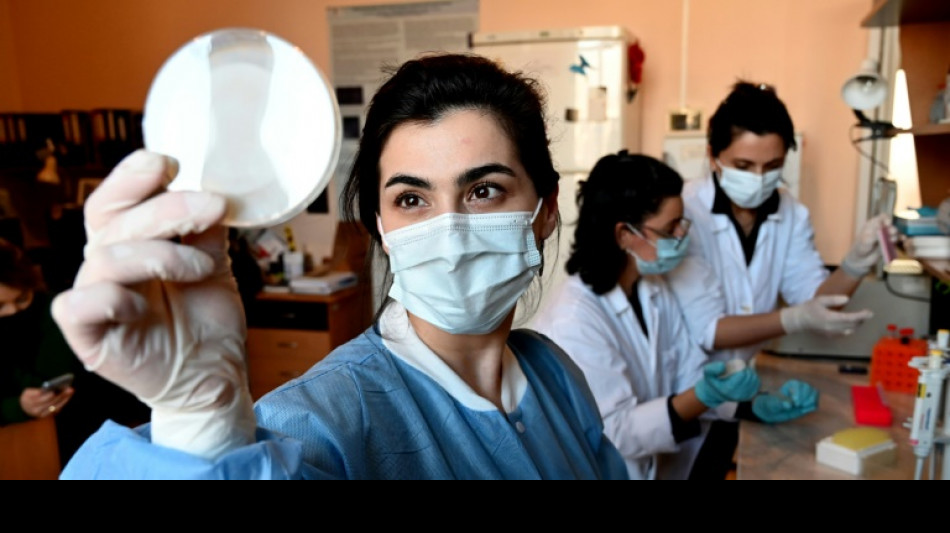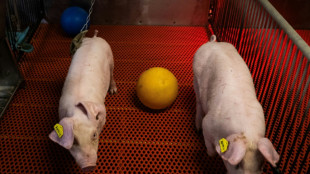
-
 Steel decline sparks protests and a movie in Belgium
Steel decline sparks protests and a movie in Belgium
-
Root 'crucial' for England ahead of Champions Trophy, says skipper

-
 Chelsea star Kerr 'feared for my life' during taxi ride
Chelsea star Kerr 'feared for my life' during taxi ride
-
India's Rohit insists struggles 'nothing new' ahead of England ODIs

-
 Even in career twilight, Ronaldo's star undimmed at 40
Even in career twilight, Ronaldo's star undimmed at 40
-
Barca avoiding 'excuses' after Real Madrid ref complaints: Flick

-
 Australia fear rank turner for second Sri Lanka Test
Australia fear rank turner for second Sri Lanka Test
-
EU seeks new import fee on e-commerce packages

-
 Oscars frontrunner 'Emilia Perez' suffers awards season crash
Oscars frontrunner 'Emilia Perez' suffers awards season crash
-
Swedish police say school killing spree gunman likely shot himself

-
 Stocks, dollar drop as tariff tensions intensify
Stocks, dollar drop as tariff tensions intensify
-
Oil giants TotalEnergies, Equinor reduce low-carbon investments

-
 Kremlin calls Zelensky's readiness for Putin talks 'empty words'
Kremlin calls Zelensky's readiness for Putin talks 'empty words'
-
Trump bid to take over Gaza, move Palestinians faces backlash

-
 Liverpool's Slot not a fan of in-stadium VAR announcements
Liverpool's Slot not a fan of in-stadium VAR announcements
-
Stiff competition awaits as Vonn hunts gold in world super-G

-
 Pakistan health workers kick off polio drive despite snow
Pakistan health workers kick off polio drive despite snow
-
Austria's Puchner tops second downhill training at world champs

-
 Bid to sell Suu Kyi's Myanmar mansion flops for third time
Bid to sell Suu Kyi's Myanmar mansion flops for third time
-
Aga Khan: racehorse billionaire and Islamic spiritual leader

-
 China slams US 'suppression' as trade war deepens
China slams US 'suppression' as trade war deepens
-
Sri Lanka's Karunaratne to bow out of Tests after 'fulfilling dream'

-
 Philippine House votes to impeach VP Sara Duterte
Philippine House votes to impeach VP Sara Duterte
-
Tokyo police bust alleged prostitution ring targeting tourists

-
 Baltics to cut Soviet-era ties to Russian power grid
Baltics to cut Soviet-era ties to Russian power grid
-
Iraq's famed 'hunchback' of Mosul rebuilt brick by brick

-
 Stock markets stutter as traders weigh China-US trade flare-up
Stock markets stutter as traders weigh China-US trade flare-up
-
Hamas rejects Trump proposal to take over Gaza, move Palestinians

-
 MotoGP champion Martin taken to hospital after Malaysia crash
MotoGP champion Martin taken to hospital after Malaysia crash
-
YouTubers causing monkeys to attack tourists at Cambodia's Angkor Wat

-
 Sweden reels from worst mass shooting in its history
Sweden reels from worst mass shooting in its history
-
India's Modi takes ritual dip at Hindu mega-festival

-
 Nissan shares fall as reports say Honda merger talks off
Nissan shares fall as reports say Honda merger talks off
-
US Postal Service says suspending parcels from China

-
 Toyota announces Lexus EV plant in Shanghai
Toyota announces Lexus EV plant in Shanghai
-
Santander reports record profit for third straight year

-
 No new clothes: S. Korean climate activist targets hyperconsumption
No new clothes: S. Korean climate activist targets hyperconsumption
-
Cummins 'hugely unlikely' for Australia's Champions Trophy bid

-
 Nissan shares plunge as report says Honda merger talks off
Nissan shares plunge as report says Honda merger talks off
-
China holds out hope last-minute deal can avert US trade war

-
 LeBron relishing 'special' Doncic double act
LeBron relishing 'special' Doncic double act
-
Tatum shines as Celtics down Cavs, Lakers thrash Clippers

-
 Myanmar junta bid to sell Suu Kyi mansion flops for third time
Myanmar junta bid to sell Suu Kyi mansion flops for third time
-
Australia bans DeepSeek AI program on government devices

-
 Olympics on horizon as China hosts Asian Winter Games
Olympics on horizon as China hosts Asian Winter Games
-
Tatum, White shine as Celtics down Cavs

-
 Google pledge against using AI for weapons vanishes
Google pledge against using AI for weapons vanishes
-
African football has the platform for historic World Cup success

-
 France prop Gros happy to go 'under radar' for Dupont's benefit
France prop Gros happy to go 'under radar' for Dupont's benefit
-
Bove's future uncertain after heart attack horror as Fiorentina finish Inter clash


Viruses that could save millions of lives
It may seem strange after a pandemic that has killed millions and turned the world upside down, but viruses could save just as many lives.
In a petri dish in a laboratory in the Georgian capital Tbilisi, a battle is going on between antibiotic resistant bacteria and "friendly" viruses.
This small nation in the Caucasus has pioneered research on a groundbreaking way to tackle the looming nightmare of bacteria becoming resistant to the antibiotics on which the world depends.
Long overlooked in the West, bacteriophages or bacteria-eating viruses are now being used on some of the most difficult medical cases, including a Belgian woman who developed a life-threatening infection after being injured in the 2016 Brussels airport bombing.
After two years of unsuccessful antibiotic treatment, bacteriophages sent from Tbilisi cured her infection in three months.
"We use those phages that kill harmful bacteria" to cure patients when antibiotics fail, Mzia Kutateladze of the Eliava Institute of Bacteriophages told AFP.
Even a banal infection can "kill a patient because the pathogen has developed resistance to antibiotics," Kutateladze said.
In such cases, phagotherapy "is one of the best alternatives", she added.
Phages have been known about for a century, but were largely forgotten and dismissed after antibiotics revolutionised medicine in the 1930s.
- Stalin's henchman -
It didn't help that the man who did most to develop them, Georgian scientist Giorgi Eliava, was executed in 1937 on the orders of another Georgian, Lavrentiy Beria, Stalin's most notorious henchman and the head of his secret police.
Eliava had worked in the Pasteur Institute in Paris with French-Canadian microbiologist Felix d'Herelle, one of the two men credited with discovering phages, and persuaded Stalin to invite him to Tbilisi in 1934.
But their collaboration was cut short when Beria had Eliava killed, although his motive still remains a mystery.
With the World Health Organization now declaring antimicrobial resistance a global health crisis, phages are making a comeback, especially as they can target bacteria while leaving human cells intact.
A recent study warned that superbugs could kill as many as 10 million people a year when antimicrobial resistance due to overuse of antibiotics reaches a tipping point. That could come within three decades.
- 'Training' viruses -
While phages-based medicines cannot completely replace antibiotics, researchers say they have major pluses in being cheap, not having side-effects nor damaging organs or gut flora.
"We produce six standard phages that are of wide spectrum and can heal multiple infectious diseases," said Eliava Institute physician Lia Nadareishvili.
In some 10 to 15 percent of patients, however, standard phages don't work and "we have to find ones capable of killing the particular bacterial strain," she added.
Tailored phages to target rare infections can be selected from the institute's massive collection -- the world's richest -- or be found in sewage or polluted water or soil, Kutateladze said.
The institute can even "train" phages so that "they can kill more and more different harmful bacteria."
"It is a cheap and easily accessible therapy," she added.
- Last-resort treatment -
A 34-year-old American mechanical engineer suffering from a chronic bacterial disease for six years told AFP he "already felt improvement" after two weeks at the Tbilisi institute.
"I've tried every possible treatment in the United States," said Andrew, who would only give his first name.
He is one of the hundreds of patients from around the globe who arrive in Georgia every year for last-resort treatment, said Nadareishvili.
With the traditional antimicrobial armoury depleting rapidly, more clinical studies are needed so that phagotherapy can be more widely approved, Kutateladze argued.
In 2019, the United States Food and Drug Administration (FDA) authorised a clinical study on the use of bacteriophages to cure secondary infections in Covid patients.
Beyond medicine, phages are already being used to stop food going off, and they "can be used in agriculture to protect crops and animals from harmful bacteria," Kutateladze said.
The institute has already conducted research on bacteria targeting cotton and rice.
Bacteriophages also have potential to counter biological weapons and combat bioterrorism, with Canadian researchers publishing a 2017 study on using them to counter an anthrax attack on crowded public places.
C.Meier--BTB



